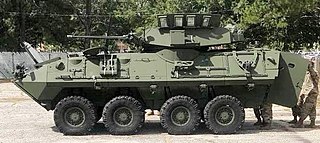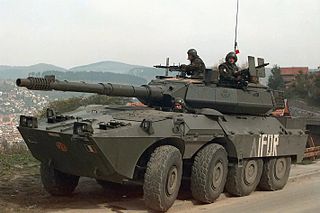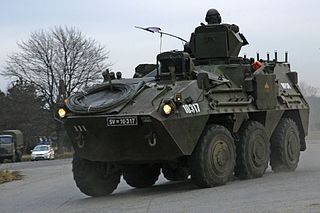
A tank destroyer, tank hunter or tank killer is a type of armoured fighting vehicle, predominantly intended for anti-tank duties. They are typically armed with a direct fire artillery gun, also known as a self-propelled anti-tank gun, or missile launcher, also called an anti-tank missile carrier. The vehicles are designed specifically to engage and destroy enemy tanks, often with limited operational capacities.

The Merkava is a series of main battle tanks used by the Israel Defense Forces (IDF) and the backbone of the IDF's Armored Corps. Current iterations of this tank are considered broadly equivalent to the capabilities of the M1 Abrams, Leopard 2 and the Challenger 2. The current iteration of this vehicle also shares the same MTU EuroPowerPack powerplant as a number of other MBT platforms.

The M60 is an American second-generation main battle tank (MBT). It was officially standardized as the Tank, Combat, Full Tracked: 105-mm Gun, M60 in March 1959. Although developed from the M48 Patton, the M60 tank series was never officially christened as a Patton tank. The US Army considered it a "product-improved descendant" of the Patton tank's design. The design similarities are evident comparing the original version of the M60 and the M48A2. It has been sometimes informally grouped as a member of the Patton tank family. The United States fully committed to the MBT doctrine in 1963, when the Marine Corps retired the last (M103) heavy tank battalion. The M60 tank series became America's primary main battle tank during the Cold War, reaching a production total of 15,000 M60s. Hull production ended in 1983, but 5,400 older models were converted to the M60A3 variant ending in 1990.

The FV101 Scorpion is a British armoured reconnaissance vehicle, and also a light tank. It was the lead vehicle and the fire support type in the Combat Vehicle Reconnaissance (Tracked), CVR(T), family of seven armoured vehicles. Manufactured by Alvis, it was introduced into service with the British Army in 1973 and was withdrawn in 1994. More than 3,000 were produced and used as a reconnaissance vehicle or a light tank.

The LAV-25 is a member of the LAV II family. It is an eight-wheeled amphibious armored reconnaissance vehicle built by General Dynamics Land Systems and used by the United States Marine Corps and the United States Army.

The ASCOD armoured fighting vehicle family is the product of a cooperation agreement between Austrian Steyr-Daimler-Puch AG and Spanish General Dynamics Santa Bárbara Sistemas. Both companies are now divisions of a unit of General Dynamics. The ASCOD family includes the LT 105 light tank equipped with a 105 mm gun, a surface-to-air missile launcher, an anti-tank guided missile launcher, mortar carrier, R&R vehicle, command-and-control vehicle, ambulance, artillery observer, and the AIFV model.

The Centauro is a family of Italian military vehicles originating from a wheeled tank destroyer for light to medium territorial defense and tactical reconnaissance. It was developed by a consortium of manufacturers, the Società Consortile Iveco Fiat - OTO Melara (CIO). Iveco Fiat was tasked with developing the hull and propulsion systems while Oto Melara was responsible for developing the turrets and weapon systems.

The Pandur II is an improved modular all-wheel-drive version of the Pandur 6x6 APC wheeled armoured vehicle. It was developed as a private venture by the Austrian company Steyr-Daimler-Puch Spezialfahrzeuge. Steyr-Daimler-Puch Spezialfahrzeuge is part of General Dynamics European Land Systems (GDELS), which is also the parent company of MOWAG of Switzerland and Santa Bárbara Sistemas of Spain.

The K21 is a South Korean infantry fighting vehicle. A replacement for the K200-series, it was formerly designated as K300 or XK21 KNIFV. The initial production began in 2009, with the Republic of Korea Army planning to field approximately 466 units. It is designed to effectively defeat other IFVs as heavily armed and armored as the BMP-3.

The M1128 Mobile Gun System (MGS) is an eight-wheeled assault gun of the Stryker family, mounting a 105 mm tank gun, based on the Canadian LAV III light-armored vehicle manufactured by General Dynamics Land Systems for the U.S. Army.

Lahko kolesno oklepno vozilo Valuk is an improved version of Pandur 6X6 APC, manufactured under a license manufacturing agreement with the Austrian company, Steyr Daimler Puch Spezialfahrzeug AG & Co KG, by Sistemska Tehnika of Slovenia for the Slovenian Army.

The VBTP-MR Guarani is a 6×6 armoured personnel carrier developed by Iveco and the Brazilian Army as part of its "Urutu-III" modernization program aimed to replace all EE-11 Urutu by 2015. The 8×8 version of the VBTP-MR is the base of Iveco's Superav armoured personnel carrier. Other Brazilian companies also participated in the program, such as IMBEL (Communications), Elbit (Armaments), Usiminas and Villares.

Tulpar is a Turkish heavy infantry fighting vehicle designed by the Sakarya-based automotive manufacturer Otokar. It is named after the Tulpar, a winged horse in Turkic mythology.

The Type 08 is a family of eight-wheeled amphibious, modular armored vehicle developed by Norinco for infantry fire support, battlefield logistics, and quick reaction operations. Developed in the early 2000s, the modern Chinese vehicle family were produced for more than 6000 hulls and widely deployed by the People's Liberation Army Ground Force and People's Liberation Army Marine Corps.

Kaplan MT or Harimau is a light tank jointly developed by Turkish manufacturer FNSS and Indonesian manufacturer Pindad. The development program name for the tank is Modern Medium Weight Tank (MMWT). The tank itself is called Kaplan MT by Turkey and Harimau by Indonesia, both meaning "tiger".

The Type 15, nicknamed the Black Panther, is a Chinese third generation light tank family operated by the People's Liberation Army Ground Force, People's Liberation Army Navy Marine Corps, and People's Liberation Army Air Force Airborne Corps. The tank is also exported to the Bangladesh Army. It is the effective successor to the Type 62 light tank that was retired from the Chinese army in 2013. The export version of the tank is known as VT-5.

The Armor "Pambato" Division was formerly known as the Mechanized Infantry Division before it was renamed in anticipation of its upcoming assets and ongoing reorganization of units of the Philippine Army as part of the modernization program. It is stationed at Camp O'Donnell, Brgy. Sta. Lucia, Capas, Tarlac and is one of the service's major units. The Armor Division is a combined arms organization composed of tank, cavalry and mechanized infantry.

The M10 Booker is an armored fighting vehicle under development by General Dynamics Land Systems (GDLS) for the United States Army, developed from the GDLS Griffin II armored fighting vehicle as the winner of its Mobile Protected Firepower program in June 2022. The initial contract is for 96 low rate initial production (LRIP) vehicles, with first delivery by the end of 2023.
General Dynamics European Land Systems (GDLS) is an automotive and arms manufacturer spread across Europe, with a headquarter in Madrid, Spain. It is a business unit of General Dynamics which consolidated in one structure all European subsidiaries of GDLS.




















